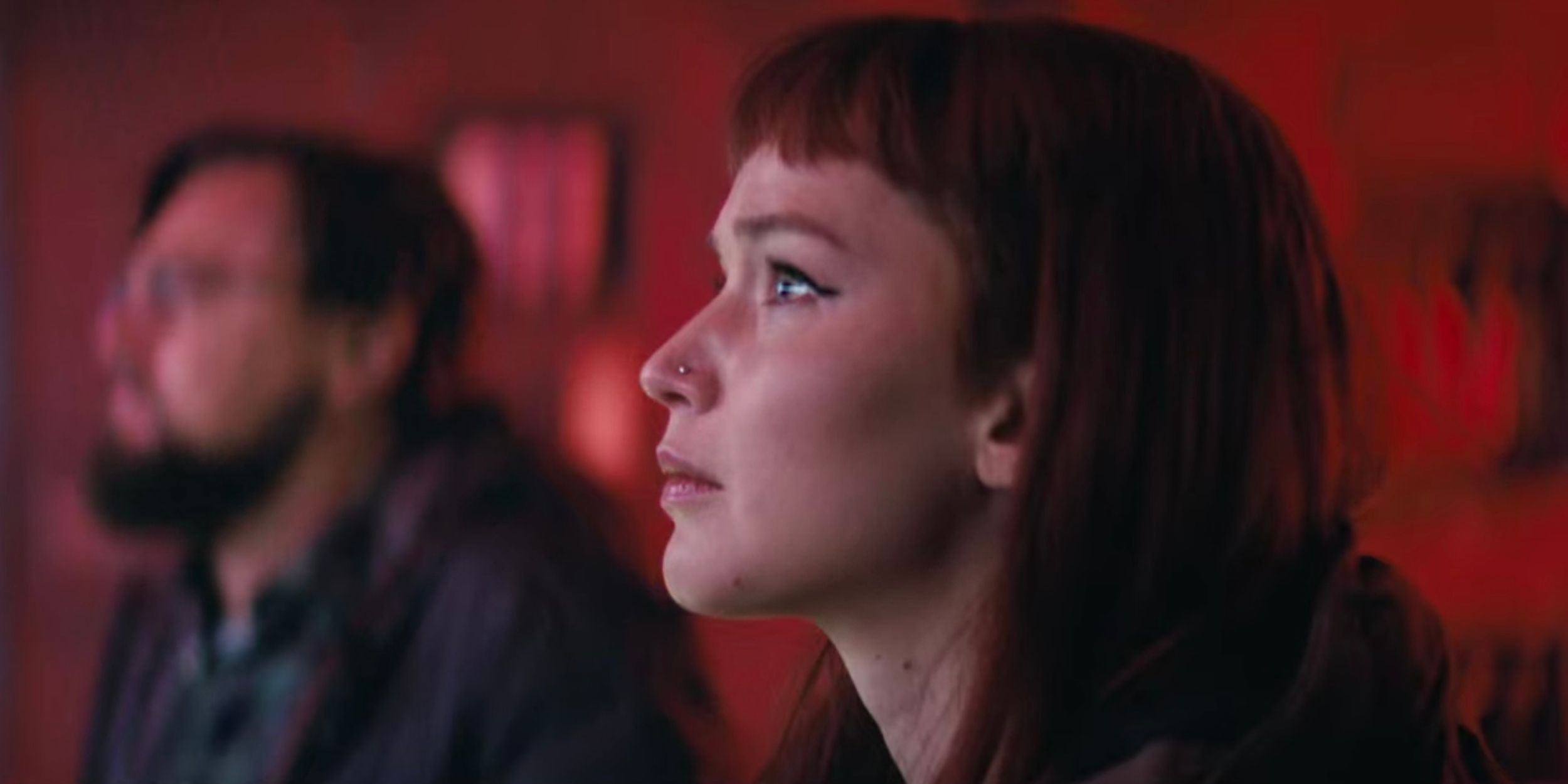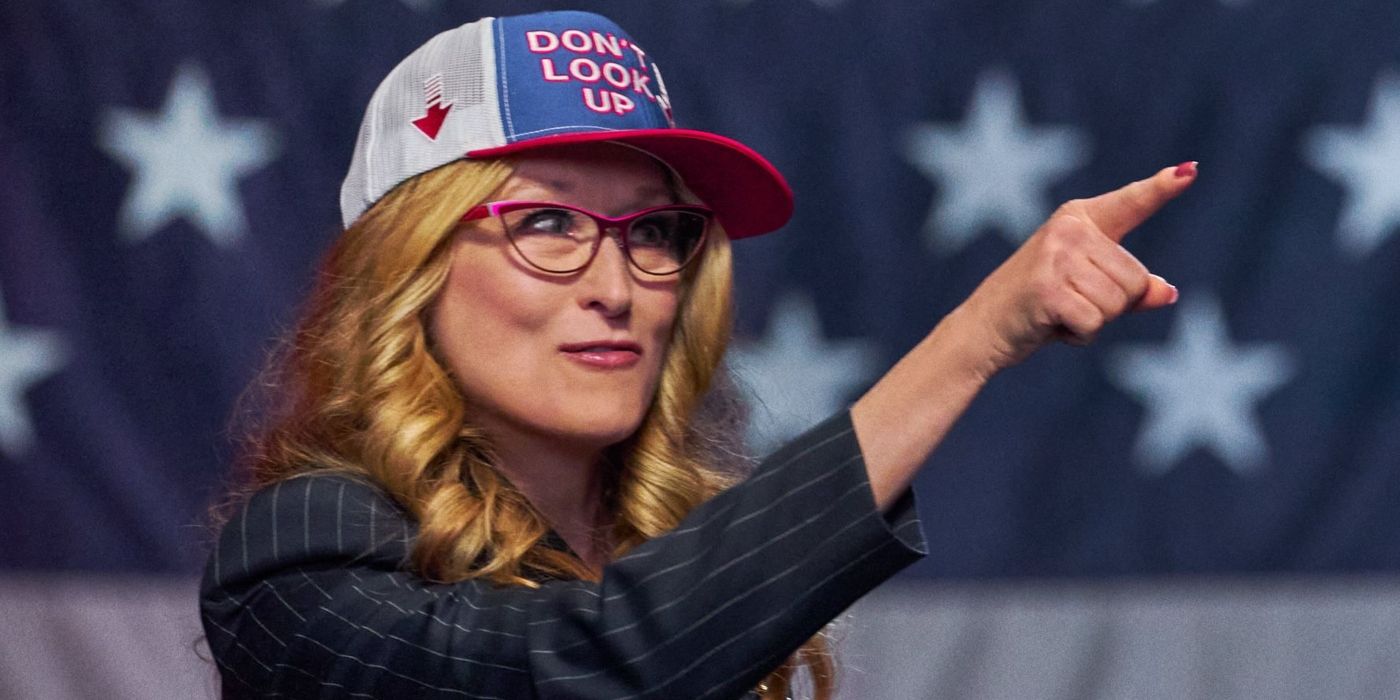WARNING: The following contains major spoilers for Don't Look Up, now streaming on Netflix.
Don't Look Up is already Netflix's second-biggest hit, but it probably tops the list for most talked-about. Adam McKay's pitch-black satire didn't play well with critics who lambasted its lack of subtlety and what some called an imperfect metaphor for climate change. Then, shortly after its Christmas Eve premiere, Twitter became a rhetorical battleground in which fans of the movie, including several prominent scientists, took on its detractors, including many of those aforementioned critics. Some even implied that to dismiss Don't Look Up was to dismiss the very importance of environmental issues.
Of course, it is possible to dislike a comedy that's (only metaphorically) about climate change and still care about climate change. But what Don't Look Up's defenders seem to understand and what its critics don't is that McKay wasn't trying to be subtle, and the movie isn't meant to convince anybody that the climate crisis is real and should be taken much, much, much more seriously. As the film itself argues, those who want to delude themselves will absolutely find a way. Don't Look Up isn't even about science or politics; it's a giant cathartic scream into the void for the exasperated millions who already share its point of view.
Hollywood gets labeled "liberal" and "elitist" a lot these days, which is both true to the extent that a majority of creative people and California residents vote blue, and also ironic because the entertainment industry (let's not forget the blacklist) is a big part of the American capitalist machine. Typically, when studios make movies with left-leaning messages about the climate, abortion, unions or diversity, the result is a serious, sensitive film designed to let the viewer walk a mile in someone else's shoes or, failing that, at least consider an issue from another angle.
If McKay was making one of those, Jennifer Lawrence's astronomy grad student Kate Dibiasky -- who is the audience's surrogate -- would come to understand the threat posed by the comet, work to build consensus and, finally, save the world. Instead, like a bizarro Emperor's New Clothes, Kate immediately accepts the devastating truth about the planet's imminent destruction and she's the only one who never wavers in her convictions. She's enraged not only by the public's unwillingness to face that truth, but by institutions' disinterest in helping her solve the problem. Even her mentor (Leonardo DiCaprio as Dr. Randall Mindy) falls victim to what McKay clearly thinks is the real conundrum: the way we all fail to cooperate for the sake of the greater good if it means we may personally lose out. Don't Look Up was made to let the Kates of the world commiserate.
The ostensibly absurdist comedy does put some obvious targets in its crosshairs. Meryl Streep's President Orlean with Jonah Hill as her son, plus the throngs of followers in matching ballcaps are an unmistakable allusion to Trump, his kids and his proud contrarian devotees. Still, it's telling that the film restrains from partisanship. President Orlean poses for photos with prominent Democrats. That's not an attempt to pander to some win-overable middle; McKay is putting most of the political spectrum on notice. Tech bros get called out, too. Every Silicon Valley billionaire who's commissioned a phallic rocket in the last year is represented by Mark Rylance's Peter Isherwell. But this isn't a joke about how Elon Musk and Jeff Bezos are engaging in some manhood measuring contest; it's a warning that what they're really doing is hoarding resources and power so they can live on free of consequences as the rest of us burn.
Don't Look Up also has its claws out for the media with its depiction of a faux morning show hosted by Cate Blanchett and Tyler Perry's camera-ready husks of human beings. The right grumbles about the mainstream media's supposed liberal bias, but McKay knows the actual bias is toward advertisers who want to appeal to the broadest possible segment of the population. In so doing, they must maintain the illusion of some breezy upper-middle-class norm. For many concerned citizens, the media's tendency to report everything with soft-focused neutrality can be infuriating. Salad recipes and celebrity breakups are simply not newsworthy in the way that global warming, pandemics and insurrections are. Don't Look Up also shows how ridiculous it is to both-sides facts as if they are opinions.
Progressives have spent so long trying to "go high," as Michelle Obama would say, that when someone like McKay doesn't pull punches, it feels like going low. But Don't Look Up isn't an in-depth investigation or a double-blind study. It's fine for artists to make art for people who share their fears and frustrations, especially when those fears and frustrations are at their peak.
It's become fashionable to roll one's eyes at McKay for having gotten smug. People tend to separate his early work (Anchorman, Talladega Nights, Step Brothers) from his later work (The Big Short, Vice) as if he had a brilliant sketch comedy phase followed by an obnoxious self-important phase. That's also a misunderstanding of the writer/director. Those early movies can pass for slapstick, but they're satirizing the American ethos (in particular, performative masculinity) every bit as much as his more recent films. Anchorman is about workplace sexual harassment. Talladega Nights has a scene in which PowerAde and Taco Bell get product placement in a prayer to baby Jesus. McKay has always been a gadfly. It's just that the stakes have increased. We felt more comfortable laughing at women getting their butts slapped in the 70s than the Iraq war, the rapidly changing climate or the myriad other daunting political challenges that face us now.



